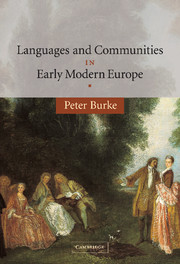Book contents
- Frontmatter
- Contents
- Acknowledgements
- Chronology 1450–1794
- Prologue: communities and domains
- 1 ‘Speak, that I may see thee’: the discovery of language in early modern Europe
- 2 Latin: a language in search of a community
- 3 Vernaculars in competition
- 4 Standardizing languages
- 5 Mixing languages
- 6 Purifying languages
- Epilogue: languages and nations
- Appendix: languages in Europe 1450–1789
- Bibliography
- Index
5 - Mixing languages
Published online by Cambridge University Press: 07 December 2009
- Frontmatter
- Contents
- Acknowledgements
- Chronology 1450–1794
- Prologue: communities and domains
- 1 ‘Speak, that I may see thee’: the discovery of language in early modern Europe
- 2 Latin: a language in search of a community
- 3 Vernaculars in competition
- 4 Standardizing languages
- 5 Mixing languages
- 6 Purifying languages
- Epilogue: languages and nations
- Appendix: languages in Europe 1450–1789
- Bibliography
- Index
Summary
Chapter 3 referred to ‘winners’ and ‘losers’ in the competition. However, in the history of language, as in the case of history in general, this contrast should not be made too sharp. The losers sometimes influence the winners to some extent, producing some kind of mixture, whether this is conscious or unconscious, pragmatic (as in the case of a lingua franca) or playful, as in the case of macaronic literature.
This process of linguistic exchange, as well as expressing the increasing cultural unification of Europe, contributed to its ‘Europeanization’, or at least offered some compensation for the gradual decline of communication in Latin. The participation of the elites of different European countries in a common culture that extended from music to warfare was marked by the creation of what the nineteenth-century Italian poet Giacomo Leopardi called ‘europeisms’ (europeismi). All the same, historians of Europe have so far had little to say about this aspect of cultural encounters, preferring to leave this topic to their colleagues the linguists. Inspired by some recent work on ‘language encounters’ in North America in particular, I have tried in what follows to extend the approach to Europe.
When there are contacts between speech communities, the influences flow in both directions and the result is cultural ‘hybridization’ or ‘transculturation’. In the case of language, the process of hybridization produces pidgins, creoles and other mixed languages.
- Type
- Chapter
- Information
- Languages and Communities in Early Modern Europe , pp. 111 - 140Publisher: Cambridge University PressPrint publication year: 2004

